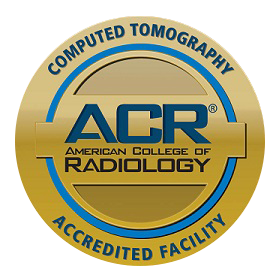More than a million Americans have a heart attack each year, and nearly half of them are fatal. Over half the people who die from a heart attack have no symptoms.
Coronary Artery Disease (CAD) is the leading cause of death for both men and women in the United States. Every 36 seconds one person dies from cardiovascular disease, and every 40 seconds someone suffers from a heart attack.
Fortunately, a Calcium Scoring test is a non-invasive test that uses a CT scan to measure the amount of calcified plaque in your coronary arteries. In roughly ten minutes, this test can help determine your risk for a heart attack and predict your risk for future heart attacks.

What are the benefits of CT Calcium Scoring?
Plaque is made up of calcium, fats, cholesterol, and other substances in the blood. It can develop gradually over time, long before there are any signs or symptoms of disease. These deposits can restrict the flow of oxygen-rich blood to the muscles of the heart. Plaque may also burst, triggering a blood clot that can cause a heart attack.
A CT Calcium Score is a non-invasive test that uses a CT scan to measure the amount of calcified plaque in your coronary arteries. This test measures your “calcium score," which helps your doctor calculate your risk of developing coronary artery disease (CAD) and related cardiac issues such as a heart attack or a stroke. It helps to determine what your best course of action might be (medication or lifestyle changes) to reduce your risk of a heart attack or other heart problems.
Calcium Score Results
The greater the coronary calcium score, the larger the amount of plaque is in the artery wall, and the greater the risk of a heart attack. The calcium score is thus a good predictor of a heart attack.
No plaque. Your risk of heart attack is low.
Small amount of plaque. You have less than a 10% chance of having heart disease.
Some plaque. You have mild heart disease and a moderate chance of heart.
You have heart disease and plaque may be blocking an artery. Your chance of having a heart attack is moderate to high.
You have more than a 90% chance that plaque is blocking one of your arteries. Your chance of heart attack is high.
What does it show that other tests do not?
A CT calcium score test shows the amount of coronary artery calcium in the coronary artery plaque, which cannot be directly imaged non-invasively. In addition, the vessels of the heart are five times more likely than those of other organs to make plaque. So, if you want to get a good idea of whether or not you are a “plaque builder,” then a CT scan of the heart might predict other types of non-coronary diseases too.

Heart Health Awareness - Get Screened Part 1
HeartFlow at ZP
Men's Health: Preventing a Heart Attack
Stroke and Brain Aneurysm Awareness with Dr. Kimon Bekelis
